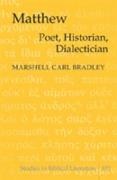Read more
Matthew: Poet, Historian, Dialectician offers a thorough and systematic display of the logic by which Matthew traces and defends the transformation of Judaism into Christianity. The present commentary carefully follows the course of Matthew's many and complex arguments as well as his extraordinary use of New Testament Greek. This book is of utmost importance for anyone interested in the New Testament, philosophy, theology, philosophy of religion, Bible studies, or Bible as literature.
Report
"For over a century the intellectually lazy and spiritually timid have sought to discredit the Higher Criticism of Wellhausen, Strauss, and Baur as a mere exercise in Hegelian philosophy, forced like a cookie cutter onto the biblical texts. What nonsense! But what might we learn if we actually did apply Hegelian insights to the New Testament? Here's our chance to find out, as we read the dynamically new approach of Marshell Carl Bradley. Matthew will never look the same again!" (Robert Price, Jesus Seminar Fellow and Author of 'Deconstructing Jesus')
"Whatever one may think of Hegel's influence in biblical scholarship, not all of it has been superficial or corrosive of traditional forms of faith and piety. Marshell Carl Bradley's magisterial linguistic-semiological commentary is one instance in which that influence has inspired a reading of Matthew meticulously respectful of the Gospel's internal integrity. Exploding with insights, Bradley's analysis moves with ease among linguistic, philosophical, and theological levels. Like a consummate grammarian, Bradley discloses for the first time Matthew's remarkably intricate strategy, leaving his readers wondering how they ever missed so much." (Philip Blosser, Professor of Philosophy and Assistant Director of the Annual Aquinas-Luther Conference, Lenoir-Rhyne College, Hickory, North Carolina)

